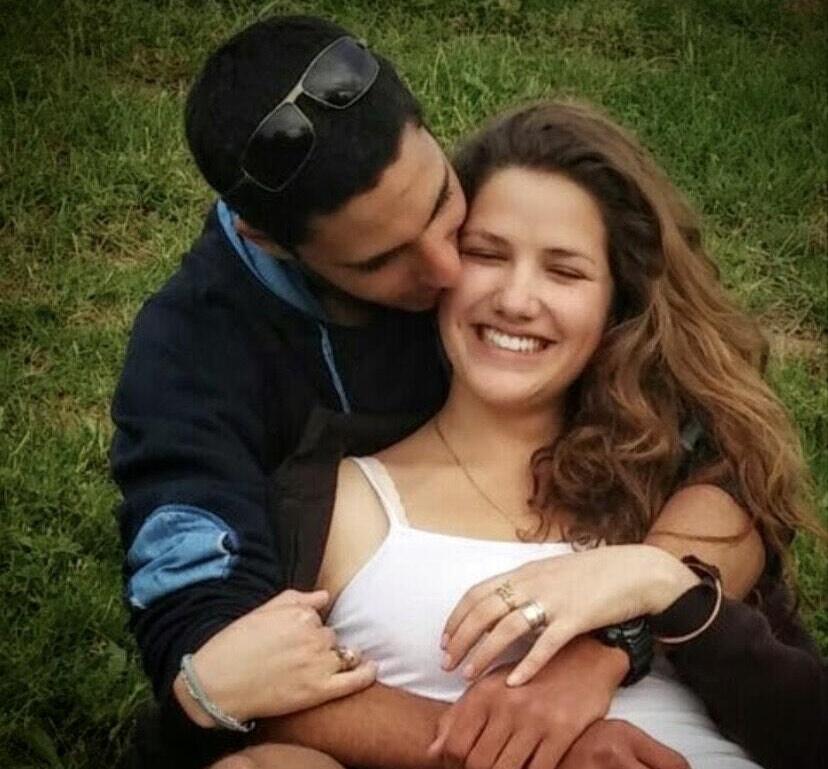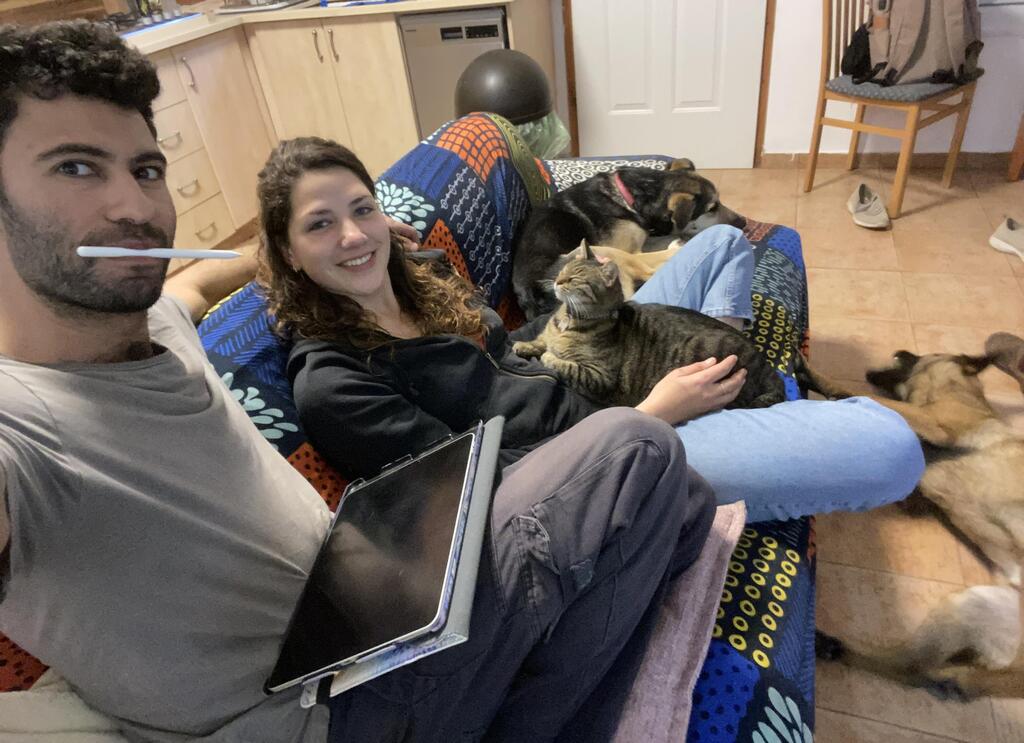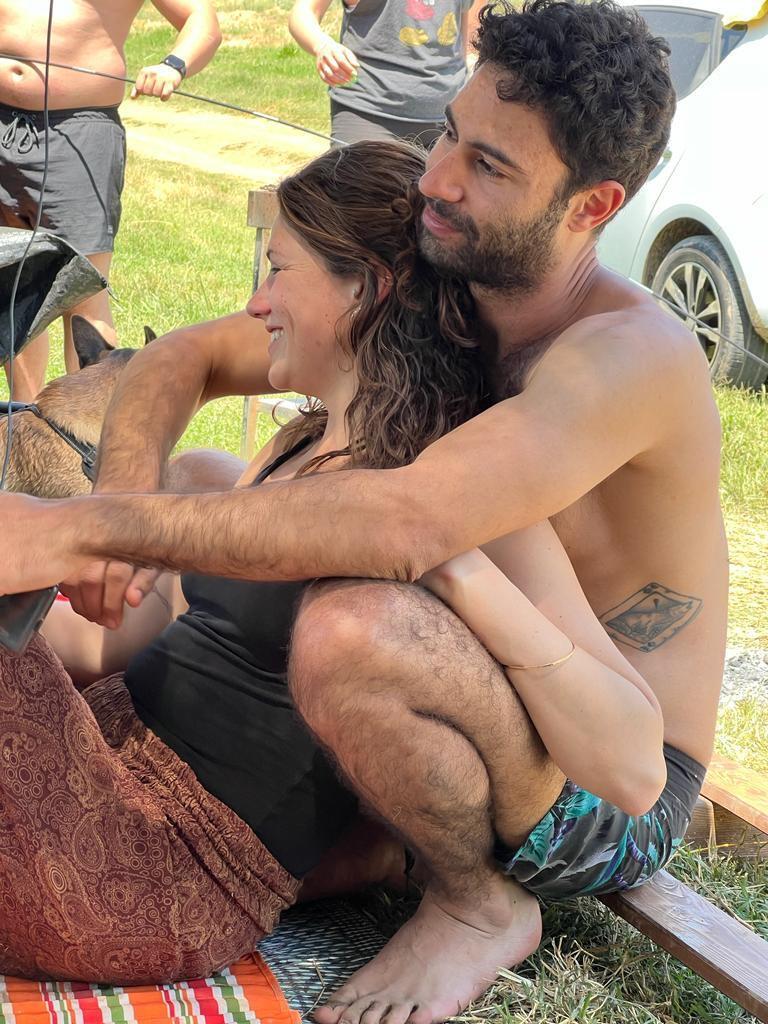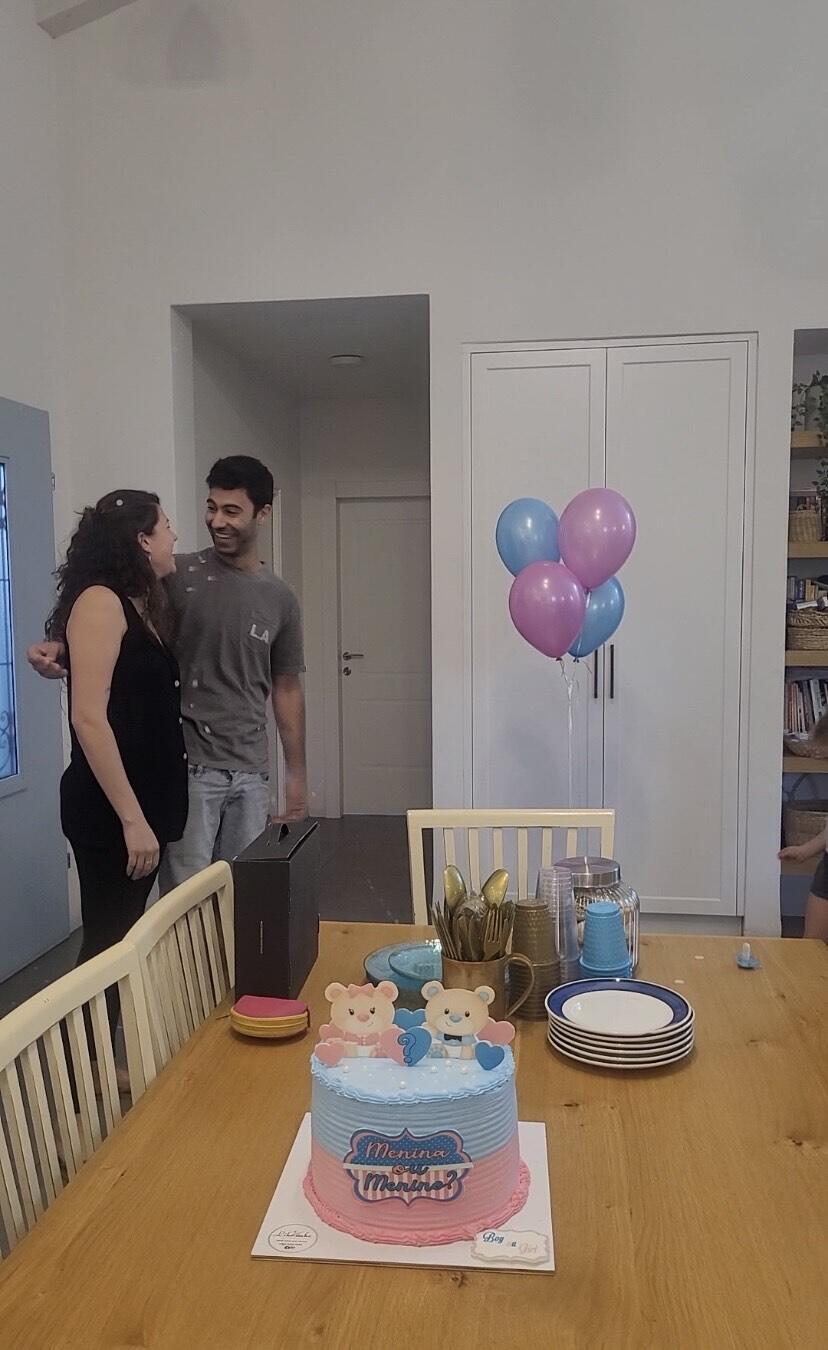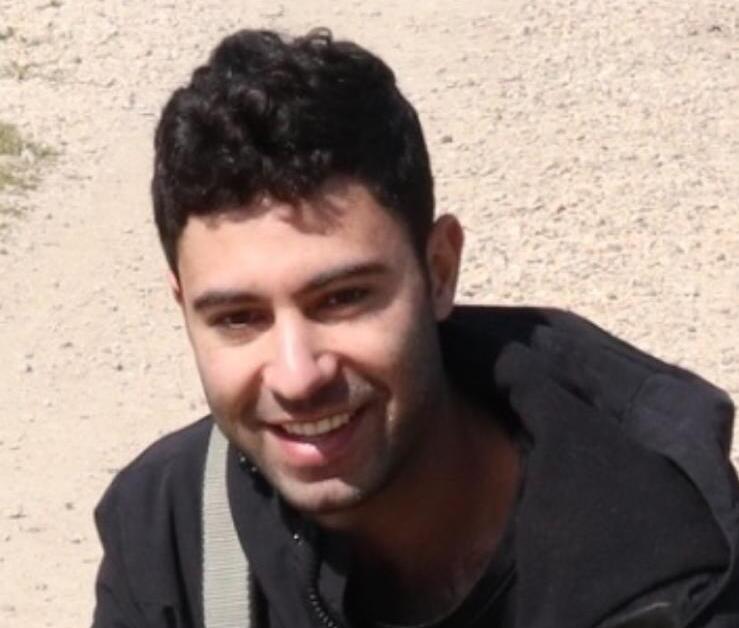Getting your Trinity Audio player ready...
"On October 7, Yaakov Ozeri arrived at Kfar Shamai, his hometown, to volunteer for the local alert squad. He volunteered for reserve duty and did everything he could so they would call him. At first, he was assigned to the northern border, and after two days he was sent to Gaza," recounts Hagar Daniels Ozeri, 27, Yaakov Ozeri’s widow, now in the eighth month of her pregnancy.
More stories:
"When they assigned him to the northern border, I asked him to stay there. I told him that the army knows what it's doing. There's one conversation that stands out for me - I told him about a woman I know who was really anxious, and her husband decided not to go to reserve duty. I told him, if I were to panic, would you stay home? And he replied, 'But you're not like that, you're strong.'"
"And what if I'm not strong? What if I'm weak, will you stay? He told me, 'No, it would just be harder for me to leave.' At that moment, I understood I had to be strong. When he was on reserve duty, I asked the nurse to make my ultrasound test a little more detailed in order to send it to him because he was in Gaza. He managed to see the ultrasound and was very excited about it," she says.
'He cared about everything'
Yaakov Ozeri was killed on November 7 in Shati, a neighborhood located in northern Gaza, where intense battles took place during the ongoing war.
"They told us that it's an area with very crowded streets. They were there for hours during intense fighting inside the tank, and Yaakov didn't rest for a moment. Once he had a short break, he immediately organized the next tank round.
“After 12 hours of fighting, he made rounds in the tank to see if everyone was okay, and his friends said that he brought them cold drink cans and a snack. They had no idea where he got them after 12 long hours; he just cared about everything. His commander told me that he had never seen a tank loader-signaler like him.
"I told him, if I were to panic, would you stay home? And he replied, 'But you're not like that, you're strong.'"
"During the fighting, the terrorists placed a charge on the tank’s shelf. Usually, charges like these don't harm the tanks, but the terrorists did their homework and knew exactly where to place the explosives. There was an explosion, and Yaakov was killed fairly quickly. They told me he didn't suffer.
“When they brought me his gear, there were eight boxes of equipment. He took everything from home, his sewing machine, the toolbox, the coffee thermos, everything to make everyone else more comfortable."
After Yaakov fell, Hadar returned to her parents' home in Kibbutz Ginegar. Two weeks ago, she returned to their shared home in Binyamina, along with their two dogs and cat. "I have a very supportive and caring environment. Yaakov's family and I are very close, both his mom, my mom and my sister come with me to check-ups and accompany me at every moment.
“I try to plan small tasks throughout the day to get up and move on. I've returned to my studies; it's hard for me to travel to the university, so I'm studying from home. I organize things for the baby and focus a lot on Yaakov's memory," she says.
"Yesterday, I sat and tried to watch a university lecture while the baby started kicking. It was the first time I could really see her movements. Yaakov managed to feel her kicking when he was on leave, a week before he died, but this time, I could see the movements from the outside.
“I was alone at home, and I really wanted to call him and show him; I even recorded a video for him. It's messed up being alone with these things now. I miss him in these little moments of excitement," she added.
"Every time I experience something new and exciting with my pregnancy. In recent weeks, I suddenly felt the baby more, and in the ultrasound you can already see clear facial features. He was so excited about these things.
“Before he was killed, we talked about whom she resembles based on the ultrasound, and now I can already feel that she has a personality inside me, and I don't have him to talk about it – maybe she's similar to his brother, maybe to my sister, maybe to me, maybe to him."
"Yaakov was exactly the same person I met at 16; we both just needed to mature a bit. When we got back together, suddenly everything felt complete and right."
Did you manage to choose a name together?
"Yes, we decided on a name. We had a name for a boy and a name for a girl. We talked about it a lot before I got pregnant. In one of the conversations, I told him, one day when we have children, I already know what our daughter’s name would be,' and he told me, 'I also have a name for a daughter.'
'It was clear to both of us that if we were getting back together, it was serious'
“I told him, 'Okay, you can say the name you're thinking of, maybe we’ll use it for our second daughter.' He said the name, and it was exactly the name I wanted. There wasn't even an argument about it. The moment we found out it was a girl, we knew her name, and we also knew her nickname."
Hagar and Yaakov met at a party when she was 16, and he was 17. They were together for five years, then separated. About a year and a half ago, they rekindled their relationship. "During these five years, each of us lived our own life. He traveled abroad for two years, and I was in a different relationship," Hadar says.
“After my relationship ended, I happened to be in a winery in Kiryat Tivon, and I knew he had returned to Israel, so I sent him a message asking if he still lived there and how he’d been. From that moment, we rekindled our relationship, and things continued quite quickly. It was clear to both of us that if we were getting back together, it was serious.
"We tried to take things slowly, but neither of us knew how to. Yaakov was exactly the same person I met at 16; we both just needed to mature a bit. When we got back together, suddenly everything felt complete and right. We felt like we found where we needed to be.
“About four months after we got back together, he already gave me a key to his apartment, and a month later, we moved in together. After a year passed since we got back together I became pregnant. Everything happened really fast, but nothing surprised us; it felt very natural.
"Generally, we planned on having children together, but only after I finished my degree and he finished his second year of studies, but she beat us to it. When we found out I was pregnant, it took him a few days to digest it," according to Hadar.
“It was important for him to understand what I wanted to do - whether I wanted to keep it or if I wanted to try again later. I asked him what he wanted to do, and he said he wanted to keep it: 'I'll take whatever comes my way.' I also wanted it, and we were both very happy and excited about it.
"He already arranged his studies in a way that allowed him to spread his second year over two years because he didn't want to neglect his studies, but he also didn't want to miss out on his daughter. I tried to convince him to finish his second year as usual, but he said: 'I want to be there at every moment.' He really took care of me throughout the pregnancy, and even after October 7 he made sure I wouldn't be alone.”
Did you think about getting married?
"Yes, but we didn't make it. We talked about it, but we didn't want to get married because of the pregnancy but because of a mutual decision. A week before he died, I sent him a message saying I think I want to get married, and he said he was also thinking about it. We agreed that when everything was over we'd have a wedding, and we didn't make it. A week later, he died."
What will you tell your daughter about him?
"I’ll tell her everything from the beginning. I play his voice for her in videos in the morning and evening; she already hears it while she's in the womb, and I’ll keep doing it after she’s born. Yaakov left behind a lot of artwork. Our house is filled with his paintings, and I’ll take them with me when I move to live in a kibbutz near my parents ahead of the birth.
“It's important to me that she knows everything about him from day one, that he’ll be present in her life, and that it won't be a taboo subject. From the moment she’s born, she’ll already know his voice. Even now, she recognizes his voice and reacts to it.
"The first thing I want her to know is that he was really expecting her, that he really wanted to meet her, and he was curious about who she would be. I’ll tell her about the person he was, an amazing artist; he was the most accepting and non-judgmental person I’ve known.
"During the shiva and since he fell, I constantly meet more and more people who knew him, and everyone tells me the same thing – that everyone managed to find their place next to him. He wasn't loud, he wasn't the first person you heard when you entered the room, but somehow, when you left that room, you knew who he was.
“He was open, accepting, supportive, and provided a sense of safety to everyone around him; being near him, you felt that everything was okay.
"It's important to me that she knows everything about him from day one, that he’ll be present in her life, and that it won't be a taboo subject."
It sounds like something in the way Yaakov lived and his approach to things can empower people even when he's gone.
"Yes, that's what I'm trying to do. I'm really trying now to connect with his approach. He wasn't afraid; he just did what needed to be done. Even when he enlisted and during his studies, it was important for him to give his best.
“He always strived to improve as an artist and as a person, but alongside that, his approach was 'it is what it is, and that’s good enough.' I'm really trying to adopt that mindset and deal with whatever comes. It's challenging to do it alone, but I have no choice now."
How do you choose to commemorate him?
"Yaakov was an amazing handyman. Besides sewing, would also paint and tattoo. He left behind so much artwork that it was important for us to have an exhibition in his memory and to establish a scholarship for students in his name. Additionally, our family is working on opening an arts center in his hometown named after him. I know he would have been happy about it."



